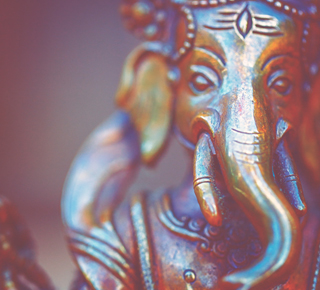
Hinduism, the fourth most-popular religion in the world, originated in the Indian subcontinent. The purists call it the Sanâtana Dharma (the eternal law) and, to them, it is more than a religion and is considered to be a very virtuous way of life.
Hinduism is definitely the oldest existing religion in the world. It has more than a billion followers and 90% of them live in the southern part of Asia - particularly India, Nepal, Bhutan and Sri Lanka - with Nepal being the only official Hindu country in the world.
From its origins in the Indian subcontinent, Hinduism spread selectively to other parts of the world. It spread only through migration as the ideas of evangelism and conversion are absent in Hinduism. Some other countries which have high populations of Hindus include Mauritius, Bangladesh, Indonesia, Pakistan, Malaysia, Singapore, United Kingdom, Fiji, Canada, Guyana, Suriname and Trinidad and Tobago.
The followers of Hinduism are called ‘Hindus’. The term is a Persian vocal distortion of the word ‘Sindhu’, which is the ancient name for the River Indus running through the then-northern India. It is more of an accumulation of the evolving ways of life and beliefs of the inhabitants of that particular region than a doctrine. It is a conglomerate of various traditions and beliefs and has no unique founder.
Northern India assimilated certain beliefs of the late Neolithic and early Harappan period (5500-2600 BC) after the advent of the Aryans into North India. Modern Hinduism sprang up from the ancient sacred texts called the Vedas, and assimilated many beliefs from Indo-European religions like Zoroastrianism, thereby incorporating many strong elements of nature gods and goddesses. By the 4th century BC, Vedic Hinduism had spread its roots all over the Indian subcontinent by absorbing elements of all the local religious practices and beliefs. It evolved further over the next 10 centuries and is the origin of both Buddhism and Jainism, which include an emphasis on vegetarianism and the doctrine of non-violence.
Under the glorious Golden Epoch of the Gupta dynasty (4th to 6th century AD), the Hindu thoughts were more formalized and Hinduism's systematisation flourished. Many classical works (shastras) of the Hindu philosophy had been codified by then, the major epics - the Mah?bh?rata and the R?m?yana - were revised to their present forms and the rules for idol worship, specific representations of the deities and for building structures and temples were also developed. This gathering of information lasted until the political Islamic control in India in the 7th century AD.
Over the next 8 centuries, there were countless attempts to reconcile both Hindu and Muslim theology. The mainstream Hinduism gradually became more orthodox and codified. But the ascent of the Sufi movements and Bhakti (true devotion), love for God and preaching piety brought about a point of communion between the two utterly different religions. This process had left in its wake many of the most evocative and devotional corpus of Indian history.
Hinduism underwent a number of social reforms under the British Empire. There were many spiritual and revivalist movements in the 19th century. The rule of the British Empire brought about numerous positive social reforms and eliminated many social evils and practices.
It is quite difficult to define the Hindu beliefs completely. The major themes in this religion comprise:
- Dharma (the code of ethical conduct)
- Sams?ra (The ever-going cycle of life-birth, death and rebirth)
- Karma (action and its consequences)
- Moksha (liberation from the painful samsara), and
- The various Yogas (the eternal paths to attain salvation)
The very concept of God is quite complex in itself. Most Hindus believe in Para-Brahma and the supreme spirit that pervades the Universe. Hindus also believe that the human soul or spirit (i.e., ?tman) is an indistinct part of Para-Brahma, and eternal. The ultimate goal of a Hindu's life is to realise the concept of non-duality, and to pursue a life that would lead to this realisation and ultimately reach the Moksha (salvation or freedom). Some other dualistic schools of faith worship the Para-Brahma as the Vishnu, Shiva or Shakti or Brahma, depending on the sect (the Vaishnavas, the Shaivaites etc.). The Hindu mythology and scriptures refer to the celestial entities as Devas. They are the embodiments of qualities and nature. However, they are often distinguished from a Supreme God. The corporeal human manifestations of the Gods are known as the Avataras.
We hope that get much enjoyment and enlightenment by playing our quizzes all about Hinduism!
























